
Unisa, in partnership with the June and Andrew Mlangeni Foundation, held the inaugural Memorial Lecture and Roundtable Discussion in honour of Dr Andrew Mlangeni, an African struggle icon second to none. Themed Integrity and revolutionary ethics in the year of Charlotte Maxeke, the lecture was held on 6 June 2021, a day that marked what would have been the 96th birthday of a man described as an ethical giant with integrity.
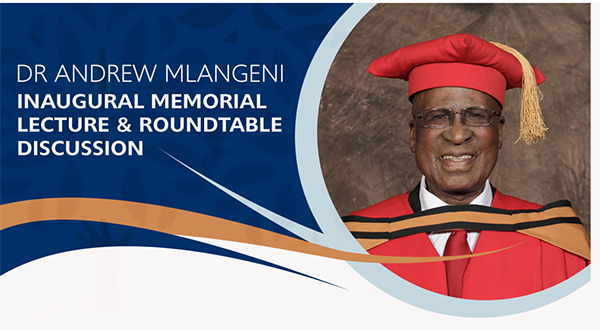
In his opening statement, Unisa’s Prof Vinesh Basdeo, Executive Dean of the College of Law, remarked as follows on the theme of the event: "Given the staying power of patriarchy and continued subjugation and violence against women and children, dedicating 2021 to the life of Charlotte Maxeke is the most symbolic measure in reassuring the South African society that government’s commitment to gender equality remains strong and purposeful."
Turning to the man of the moment, Basdeo briefly reflected on Mlangeni’s academic background, mentioning that he was a Unisa alumnus who obtained his qualifications while imprisoned on Robben Island. Mlangeni held a Bachelor of Arts and BA Honours in Political Science cum laude from the university. In 2014, Unisa awarded him an honorary doctorate in literature and philosophy. "He was the last surviving Rivonia trialist before his passing in 2020," Basdeo said. "Unisa continues to lead an impressive campaign to collect and make accessible all the documents related to the Rivonia trial, and the lives of Dr Mlangeni and other stalwarts."
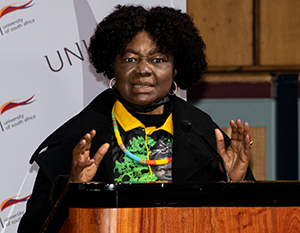
Prof Hlengiwe Mkhize
The chairperson of the June and Andrew Mlangeni Foundation, Prof Hlengiwe Mkhize, who is also the Deputy Minister in the Presidency responsible for Women, Youth and People with Disabilities, expressed her gratitude to Unisa for agreeing to the partnership. She said: "The relationship is important as we strongly believe that when institutions of higher learning recognise people whom they want to be associated with, they have a vision and aspiration to embrace what they stand for in society. This expands the vision of the university."
Mlangeni was the first chairperson of the African National Congress’s (ANC’s) integrity commission. Mkhize remarked: "He was bold and courageous. For the foundation, what we appreciate the most is that he was the least understood at the time as people felt that the ANC must not be too critical and must not be too inward-looking. Dr Mlangeni was the right person since he had courage and integrity, and lived all the values."
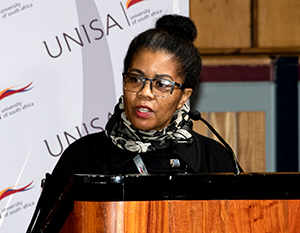
Prof Puleng LenkaBula
Unisa’s Principal and Vice-Chancellor (VC), Prof Puleng LenkaBula, stated that an examination of public archives during the first epoch of Mlangeni’s life reveals only a mention of him as one of the Rivonia trialists. She said: "The importance of this trial needs to be contextualised. The trialists were bound together by the spirit of non-racialism. In the absence of specific information about his life it is important that we, as those tasked with reconstructing the liberation moments, look at the sacrifices that he made and what shaped those decisions."
The VC said that Unisa’s partnership with the foundation is important so that South African society can continue to reflect on what is good, right and meaningful, and what restores humanity and dignity. "Furthermore," she said, "we must reflect on what enables the flourishing of society. As institutions of higher learning, we need to ensure that we are writers of our own history."
In his keynote address, the Honourable Ronald Lamola, Minister of Justice and Correctional Services, quoted Mlangeni’s 2018 statement in which he decried the escalation of youth unemployment and poverty. "As we gather in his name with an attempt to connect the past with the present, and the present with the future," said Lamola, "it should concern us that this statement resonates with so many South Africans to this day."
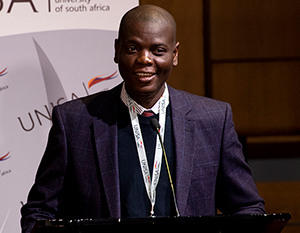
Honourable Ronald Lamola
Mentioning the disturbing official unemployment rate among the country’s youth as released by Statistics South Africa earlier this month, and the racist incidents in some schools, Lamola said that citizens are confronted with doubt about whether South Africa belongs to all who live in it. "It has become evident that there are some citizens who are still deeply committed to keeping practices of colonialism and false racial superiority," he said.
Lamola remarked: "In the name of Andrew Mlangeni, we must implement constitutional democracy in all its respects. In the implementation of the Constitution, there should be revolutionary consciousness, selflessness and integrity." He added: "We need to ensure that this society that we reconstruct is not only politically inclusive, but equally and economically inclusive. Those of us who remain need to be custodians and practitioners of Ntate Mlangeni’s legacy. He never took integrity and ethics for granted."
During the roundtable discussion the youthful panellists further reflected on the character and leadership style of both Mlangeni and Maxeke. Mzwanele Ntshwanti, a Unisa academic, spoke of Mlangeni’s exemplary conduct during the Rivonia trial. He also honoured Maxeke for her contribution to the liberation of South Africans, particularly women. Motlatsi Khosi, also a Unisa academic, focused on Mlangeni’s life on Robben Island, stating that the narratives of Maxeke and Mlangeni are exemplars of how past experiences can serve as a guide to how we conceptualise justice today.
Kgabo Morifi, researcher at the Public Service Commission of South Africa, focused on Mlangeni’s military training in China. He raised a concern: "Politics of the stomach have replaced politics of principles. One of the important lessons that Ntate Mlangeni took from China was the spirit of patriotism, which we also need to embrace."
Reflecting on Mlangeni’s involvement in the armed struggle, Dr Lebohang Motsomotso, a Unisa political science lecturer, said the youth needs to be armed differently. "We need to demand access to decolonised education," she said.
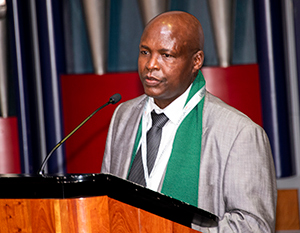
Sello Mlangeni
In summing up the roundtable discussion, Unisa’s Prof Zodwa Motsa, Executive Director: Leadership and Transformation, applauded Mlangeni for his courage for having fought for liberation and confronting injustice in his country while fighting for survival. She mentioned the challenges that South Africans still face, which include poverty and lack of language freedom. She said: "As Unisa, we are building a university that is strong and sees everyone and every language equal, a university that says African knowledge systems are central to us."
Mlangeni’s son, Sello Mlangeni, thanked Unisa, the ANC and other stakeholders for the support that the family received. "My father," he said, "advocated for education and led with integrity and ethics. It is time for us to write our own history, not European history."
In closing, Prof Madipoane Masenya, Acting Executive Director in the Office of the Principal and Vice-Chancellor, said: "We have celebrated a noble figure, and a selfless and ethical leader. I believe that this is the beginning of great things."
* By Nancy Legodi, Acting Journalist, Department of Institutional Advancement
Publish date: 2021-06-08 00:00:00.0